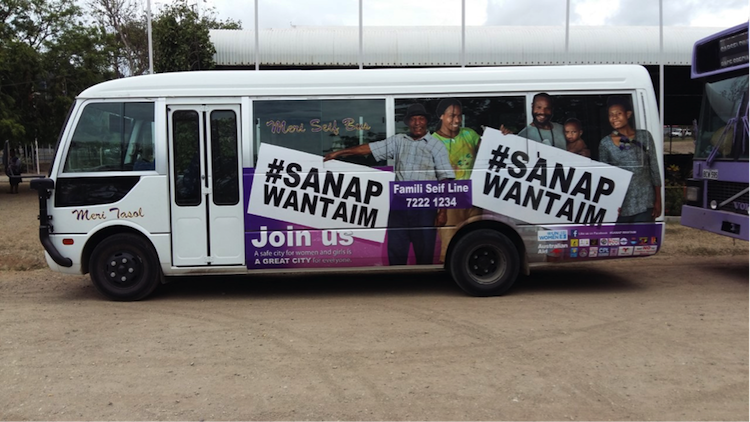
VOL. 5, No. 1
Abstract: This article traces the impact of the Ginigoada Foundation on the educational development of thousands of children and adults in Papua New Guinea (PNG). Port Moresby, capital city of Papua New Guinea (PNG), had been noted for the lack of educational opportunities for the majority of the population who lived in urban villages and squatter settlements. A “User-Pay” policy resulted in children not attending school because the costs were too high. Elsewhere in PNG, educational opportunities for children and adults were even lower. Dame Carol Kidu was instrumental in the establishment of the Ginigoada Foundation, an NGO that provides learning and training assistance, and she reflects on past and current developments in this article.
Ginigoada’s initial programs for learning and development in Port Moresby were so popular that they led to the establishment of a fleet of buses to take programs out to local communities, initially in Port Moresby (PNG’s capital city), and now the model is expanding to other provinces of PNG. Numbers of enrolments and graduation successes confirm that the Ginigoada Foundation has been very successful in terms of meeting learning needs. New developments include UNICEF-funded Open Learning Networks and the provision of a mobile WiFi library.
Keywords: mobile learning
My professional background was as a Secondary School teacher in Australia (two years) and in Papua New Guinea (20 years). After my husband’s sudden death, I successfully ran in the 1997 Papua New Guinea national elections and held various positions before retiring at the end of my third term in office in 2012.
My political career focussed on my passion for genuine Education for All (EFA) and reaching the unreached through informal learning opportunities, often regarded as at the margins of education. Many had assumed that I would prefer the Education portfolio relating to more mainstream conventional formal educational systems.
My constituency was in the capital city of Papua New Guinea, Port Moresby, which was notable for its poverty with the majority of the population living in urban villages and squatter settlements of people who had moved from the rural areas. A User-Pay policy at the time resulted in many children not going to school because their parents could not afford the school fees and uniform costs. Those who did go to primary school often did not continue to secondary education because of the lack of space in high schools. Education and poverty reduction became key electoral issues for me.
After researching similar problems in other developing countries, I used the BEUPA (Basic Education for Urban Poverty Areas1 model from Uganda as a catalyst to move forward. With some limited funds from the Australian Agency for International Development (AusAID) and support from the Chairman of the Port Moresby Chamber of Commerce (also a teacher by profession), the Ginigoada Bisnis Development Foundation (GBDF) was established.2
“Ginigoada” means “stand up strong” in the Motu language – one of the indigenous tribes of the city of Port Moresby - and embraces the concept of “learning pathways” and “lifelong learning”. In practice “the Ginigoada Foundation is a “welfare” type of NGO that provides welfare in the form of training assistance, where the beneficiary is helped towards betterment of life through the personal empowerment of education and training” (Field & Kidu, 2017, p. 1)
The desired outcomes are that each participant will be empowered and enabled to improve their personal life through further training, formal employment or income generation within the expanding informal economy. The program also aims to encourage participants in avoiding illegal, criminal or anti-social behaviour.
For many of the participants, the program offers opportunities that would not otherwise be available, and the enrolment figures and graduation numbers provide ample evidence that these opportunities are valued.
GBDF initially sponsored marginalised out-of-school youth and women for short courses that taught skills for income generation in the informal economy. However, it was clear that many people were not confident enough to leave their communities and enter the short courses offered. Our aim was also to take learning to the people in their communities to build up that needed confidence.
In response to this need, and with the help of funds provided by Asia Foundation3, GBDF started its first mobile learning unit – a bus which transported trainers and learning materials into the settlements and villages. As news of the mobile learning bus spread, requests for the service came in from all over the city and beyond. With help from the private sector, the bus fleet was increased to five buses in the city, two buses to serve the neighbouring Central Province and, later, two buses to serve Lae city.
From 2008 to 2011 it became apparent that the flow of Ginigoada participants into employment had significantly increased “but the employment market began to level out in late 2011 and demand from employers decreased” (Field & Kidu, 2017, p. 2). From 2012, this resulted in a renewed focus for Ginigoada on training activities and initiatives that develop participants’ interests and skills in the informal sector. The results included the expansion of the Mobile Training Programs, and the increased emphasis on business skills and financial literacy.
Increasing numbers of women and young girls were improving their income-generating skills but women were often reluctant to leave the safety of their communities and travel on public transport to work because of the high risk of theft and violence experienced in the public transport system. Ginigoada responded to this problem by introducing female-only public transport in Port Moresby.
In 2014 the Ginigoada Foundation launched its first Meri Seif (male-free) bus as a practical provision of support for girls and women in the community travelling to and from their workplace. The second bus was launched in February 2016, also with the support of UN Women and Australian Aid. The third bus in December 2016 was launched after support from the UN Women’s National Committee in Australia, which is currently raising money for a fourth Meri Seif bus. (Field & Kidu, 2017).

Fig 1: Meri Seif Bus 4. Photo by permission of the Ginigoada Foundation. Sanap Wantaim means stand up together in Pidgin English and promotes male champions to support women in their advocacy for equality and against gender based violence.
The Ginigoada Foundation also takes a leading role in the Meri Seif Ples program, which provides emergency safe places for women within businesses and organisations. Here Girls and Women can access refuge, shelter and support should they find themselves at risk, under threat, or being abused or assaulted. “Although the Meri Seif Bus and Meri Seif Ples projects are not training programs, the Foundation has embraced both as they are of practical support value to the female participants of the Foundation, and the community at large” (Kidu, 2015).
The mobile learning buses have become specialised in their learning content, for example, early childhood education, adult literacy, and a youth focused unit covering health and general life-skills, and also courses on financial literacy and basic skills. Some examples illustrate the more specific aims of each program.
The Young Life Program aims to engage young people from around age five to the teen years with a positive learning experience so that they will consider entering, or re-entering, the formal education system. This is promoted by the use of simple training techniques and tools, such as phonics, to deliver some foundational education components upon which to build for the future.
The Adult Training Programs aim to provide a pathway for participants towards being ‘employable’. The intention is that through the programs, participants will increase their potential for generating income through formal employment, or through activities in the informal economy. The pathway for participants is illustrated in Figure 2, which demonstrates how unemployed people can work through Ginigoada mobile bus programs to achieve the potential for employment, self-employment and on-job training.

Fig 2: Pathway from unemployed to employable through Ginigoada programs (Field & Kidu, 2017).
The Adult Training Pathway provides participants with Short Term Skills Training Courses and On-the-Job Training placements.
In 2017 there were 23 program components, offered through three centres: Port Moresby, Lae and Central Province. Overall, these comprise essential learning opportunities for youth and adults. For example, Young Life, Young Skills, Financial Skills, Health Skills, and New Adult Literacy Skills are offered at both Port Moresby and Lae. New Start adult literacy, is also offered at Central Province, as are skills for life and other programmes (Field & Kidu, 2017).
All mobile learning programs constantly undergo “review and re-evaluation of content and delivery of material to provide ongoing development and relevance to a changing society” (Kidu, 2015), and this can be illustrated by the introduction of new programs when they are relevant, such as the Mobile Wi-Fi Library and Learning Pilot in Central Province 2017 (Field & Kidu, 2017).
Of particular importance to participants, all bus courses are provided free of charge. After successful completion, learners can use their certificates to get subsidies for further short courses provided by NGOs and the non-formal education sector of the Department for Education for a nominal cost of K50 (about $20).
Data collected from participants in three programmes illustrate the substantial interest in the programs and the impact the programs have had on many of those who had previously had very few educational opportunities.
This mobile training program has been developed for children under 16 and introduces them to literacy, numeracy and some social sciences.
The program delivers a 20 day presentation at each location. Phonics is incorporated to help accelerate the rate at which children are empowered to read basic material. The intent of this program is to assist and encourage children to enter into formal education by enabling them to read, write and interact in a manner that removes or reduces any obstacle, real or perceived, to them attending school. (Field & Kidu, 2017).
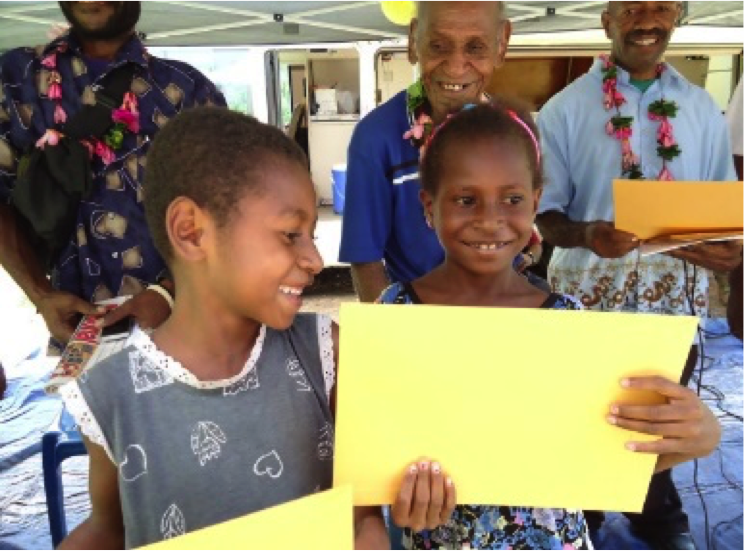
Fig 3: Young Life Graduates. Photo by permission of the Ginigoada Foundation.
From 2014-15 the Young Life program was delivered at 17 centres and attracted 1,917 participants. Up to 2015, 1,268 children had graduated from the program, that is, over 66%. This is an impressive result, particularly when considering the prior education level of the children involved, many of whom were between two and five years old.
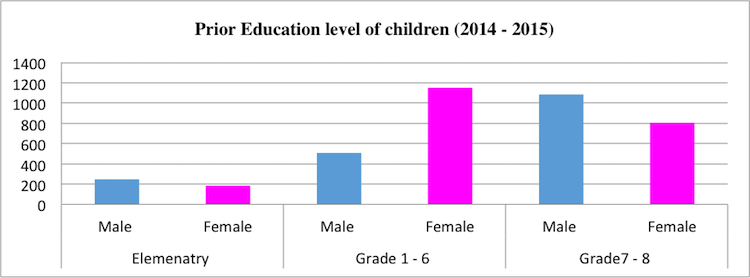
Fig 4: Prior Educational Level of children on the Young Life Program 2014.
(Ginigoada Foundation, 2015).
This program targets teenagers and young adults (from 15 onwards), delivering personal skills development training over an array of topics and subjects, which include Occupational Health and Safety, Basic Business Awareness, Family Budgeting and Conflict Resolution.
From 2012 – 2015 the programs were delivered to over 50 centres and attracted 7,637 participants, of who 5,927 graduated (over 77%). Again, this is very impressive, given the previous educational levels of the participants.
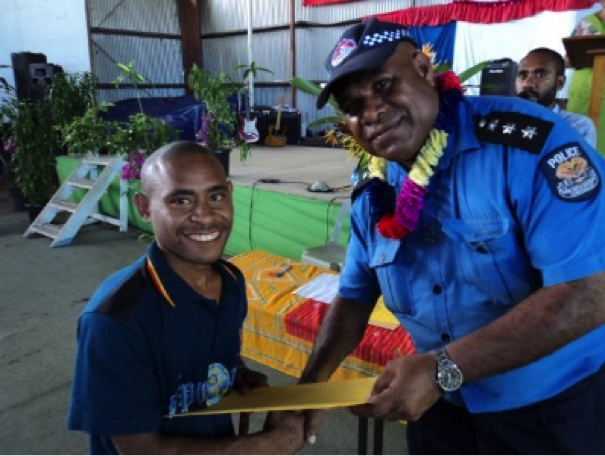
Fig 5. Graduate from the Young Skills Program.
Photo courtesy of Ginigoada Foundation.
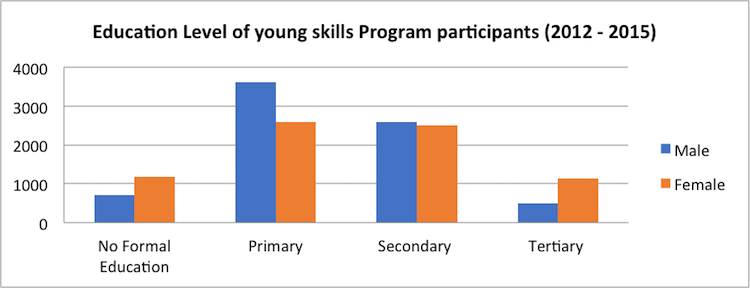
Fig. 6: Educational Level of Young Skills Program Participants 2012-2015
(Ginigoada Foundation, 2015).
The age and gender distribution of the program participants, with the largest cohort aged 20-40 years, is also of interest. Women clearly make up a smaller percentage of those enrolling but the largest numbers for both genders come from the age range 20-40.
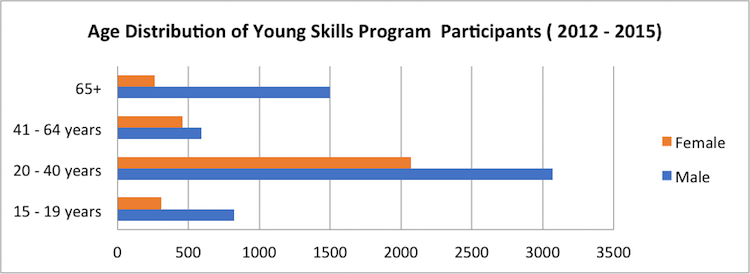
Fig 7: Gender distribution of Young Skills Program Participants 2012- 2015. (Ginigoada Foundation, 2015). Between 2012 – 2017, the program has been taken by 16,319 learners.
(Ginigoada Foundation, 2017).
This program “aims to increase participants “financial literacy” so that they will have a basic working understanding about how to form and run a group income generating activity” (Kidu, 2015).
From 2012 to 2015, this program attracted 6,635 participants of whom 4,707 graduated (71%). This is particularly impressive when large number of participants had no education beyond primary level.

Fig 8: Educational Level of Financial Literacy Participants (2012 – 2015). (Ginigoada Foundation, 2015).
From 2013 to 2017, this program has been taken by 13,635 participants. (Ginigoada Foundation, 2017).
The Ginigoada Foundation continues to expand its programs for training, learning and development for those who have previously been denied educational opportunities.
The Multi-Learning Centre, founded in Port Moresby in 2015, delivers a range of training courses for both groups and individuals, which include Small Business, Basic Computing and Customer Care. From October 2014, the Ginigoada Foundation has also taken over the “On Job Training Placement and Employment Desk” (formerly run by the Port Moresby Chamber of Commerce & Industry - POMCCI) “and separated the two important functions to allow expansion of each” (Field & Kidu, 2017). The new Employment Desk connects Ginigoada Graduates with available local business and company vacancies.
In 2017 Ginigoada is pioneering an initial Bridge School (Bris Skul) Project in Papua New Guinea’s Central Province. These schools aim to provide early child development and out of school programs within areas that are not currently able to deliver support in these key areas. The Bridge School programme, with financial assistance and expertise from UNICEF, trains interested community members to become volunteer “teachers” in community based pre-schools and learning centres. It also trains community members to establish Boards of Management to assist the volunteer “teachers”.
Two further new developments are the UNICEF funded Open Learning network that aims to bring together “organisations and groups who are providing informal, non-recognised or non-accredited, training” (Field & Kidu, 2017). The overall intention is to develop greater co-operation and pathway options between organisations, and to promote greater recognition of informal learning and training within the government of PNG. A further new pilot project in 2017 is the provision of a mobile WiFi library, through which “a selection of reading, educational and resource materials will be made available” on Central bus 6/7 programs. These buses will have hub and file-sharing hardware (Field & Kidu, 2017).
Over the past 15 years, thousands of learners of all ages and abilities have gone through Ginigoada courses with many of them finding employment and transforming their lives. I have remained Patron of the newly named Ginigoada Foundation Inc. since leaving politics and it has been blessed with visionary leadership by Pastor Mike Field who is developing a strong management team supported by a dedicated Board (still chaired by its original Chairman from the Port Moresby Chamber of Commerce). In my personal life I am renovating my home to become a Library/Learning Centre to be part of the Ginigoada network.
So much has been achieved but challenges remain and Ginigoada is now working with UNICEF funding and technical assistance to address the on-going challenge of defining pathways that learners can follow to move from informal learning into the formal education system if they so desire. The first stage of establishing a network of informal learning providers is in line with the aim to create an Open Learning Network (OLN) hub. The OLN hub will seek recognition by the formal system but does not want to be formalised and lose its flexibility, which has been a key to its success. There are many technical and policy issues to be addressed to achieve our goal but it is not impossible. The journey of education for the marginalised has been long but the journey must continue until pathways from the margins into the mainstream are defined for those learners who want to follow such a pathway. Only then can we claim to have achieved Education For All in Papua New Guinea.
Field, M., & Kidu, C. (2017). Ginigoada Training Program Outline. Ginigoada Foundation, Internal Paper.
Ginigoada Foundation. (2015). Analysis of Data 2012-15, Ginigoada Foundation, Internal Paper.
Ginigoada Foundation. (2017). Analysis of Data 2012-17, Ginigoada Foundation, Internal Paper.
Kidu, C. (2015). Ginigoada Training Program Outline. Ginigoada Foundation, Internal Paper.
Author:
Dame Dr. Carol Kidu, DBE, Dr. (Hons), was first elected to Parliament in 1997 in Papua New Guinea as the member of Port Moresby South and retired from politics in the 2012 election after serving 15 years in PNG Politics. Dame Carol Kidu is a COL Fellow and served as the Board Member of Commonwealth of Learning representing Pacific. Email: carolkidu48@gmail.com